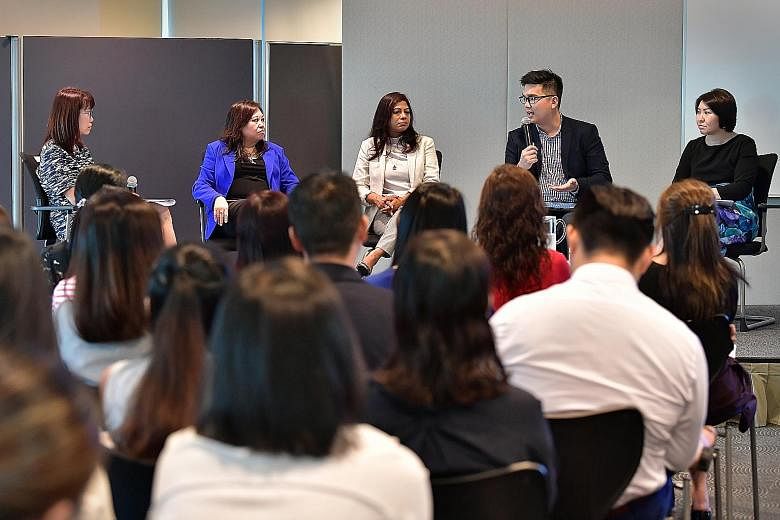A trusting office environment where workers can raise personal concerns without fear of being judged is key to helping them manage their jobs and their duties at home, a panel of experts said yesterday.
They noted that such a workplace can be created by having bosses who set clear targets, deliver good instructions and champion flexible work arrangements.
The panellists, speaking at an industry event, told attendees that the once-taboo subject of work-life harmony is increasingly a norm at workplaces.
Companies that are serious about retaining talent must build a culture that allows workers the flexibility to manage their own time and schedule as long as they can meet work targets, they added.
Their comments follow survey results released earlier that showed how more employers and employees are increasingly aligned in their views on the need for work-life harmony.
The poll, commissioned by the Tripartite Alliance for Fair and Progressive Employment Practices in partnership with The Straits Times, studied how attitudes in this area have changed since a similar survey in 2014.
Panellist Teo Sze Ling, a vice-president at OCBC Bank, said: "People are more receptive towards (work-life harmony), whether they are managers or staff."
But a "climate of psychological safety" is necessary for workers to feel safe enough to be honest with their supervisors about their needs, said Mr Amos Lim, who works at consultancy Emergenetics Caelan & Sage.
Bosses can help by walking the talk, he added, pointing out that there are supervisors who might talk about flexible work arrangements but do not support their words with action.
Measures that build trust between bosses and employees include establishing and communicating performance targets such as deadlines, instead of relying on benchmarks such as the hours they spend in the office, Mr Lim added.
Another way is to address concerns that employees might have when the boss requires sudden changes to their schedules, such as for work trips.
For example, Mr Lim's manager asks him to check with his family when he needs to go on a work trip, instead of telling him to "just go".
Trust is also important between colleagues who might have to shoulder a heavier workload as a result of flexible work arrangements, said the panellists.
Ms Teo noted that in her experience, staff were more than willing to step in if they knew why a colleague needed to take a break.
But they must also be assured that an end is in sight and that they are not left alone to manage the workload, she added.
The panellists also addressed the topic of how technology has increasingly blurred the lines between work and personal lives.
They agreed that technology is both a boon and a bane, but colleagues must discuss and set their own "rules of engagement".
Ms Teo said she once had to tell a colleague who had the habit of sending her work messages on WhatsApp in the early morning to send e-mails instead, especially if it was not an urgent issue.
Ms Teo said messages on WhatsApp seem to require a quicker response time and it is a much more personal platform.
Mr Lim added that his manager set a cut-off time to send e-mails because "even after you swipe the notification away, it is still in the back of your mind that there's one (work) e-mail message unread".


